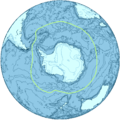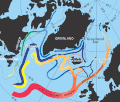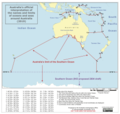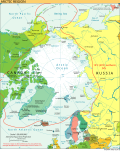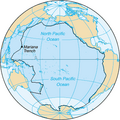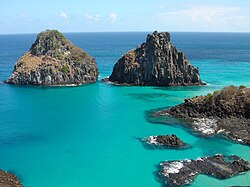Portal:Oceans
The Oceans Portal
A portal dedicated to oceans, seas, oceanography and related topics
– Hover over image and scroll to middle for controls to see more selected panorama images –
Introduction
| Earth's ocean |
|---|
|
Main five oceans division: Further subdivision: Marginal seas |
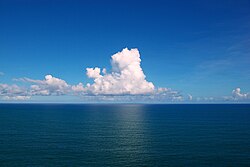
The ocean is the body of salt water that covers approximately 70.8% of Earth. The ocean is conventionally divided into large bodies of water, which are also referred to as oceans (the Pacific, Atlantic, Indian, Antarctic/Southern, and Arctic Ocean), and are themselves mostly divided into seas, gulfs and subsequent bodies of water. The ocean contains 97% of Earth's water and is the primary component of Earth's hydrosphere, acting as a huge reservoir of heat for Earth's energy budget, as well as for its carbon cycle and water cycle, forming the basis for climate and weather patterns worldwide. The ocean is essential to life on Earth, harbouring most of Earth's animals and protist life, originating photosynthesis and therefore Earth's atmospheric oxygen, still supplying half of it. (Full article...)

A sea is a large body of salt water. There are particular seas and the sea. The sea commonly refers to the ocean, the interconnected body of seawaters that spans most of Earth. Particular seas are either marginal seas, second-order sections of the oceanic sea (e.g. the Mediterranean Sea), or certain large, nearly landlocked bodies of water. (Full article...)
Oceanography (from Ancient Greek ὠκεανός (ōkeanós) 'ocean' and γραφή (graphḗ) 'writing'), also known as oceanology, sea science, ocean science, and marine science, is the scientific study of the ocean, including its physics, chemistry, biology, and geology. (Full article...)
Selected article -

Habitats lead to variations in food webs. Networks of trophic interactions can also provide a lot of information about the functioning of marine ecosystems. (Full article...)
Interesting facts -
- Only one percent of the Key West National Wildlife Refuge is above sea level.
- Elysia diomedea is one of three species of sea slug known to exhibit kleptoplasty and thus benefit from photosynthesis.
- Christopher and Cosmas were two Japanese men who travelled the world's oceans with the English explorer Thomas Cavendish between 1587 and 1592.
Selected list articles and Marine habitat topics
| Marine habitats |
|---|
| Coastal habitats |
| Ocean surface |
| Open ocean |
| Sea floor |
- List of oceans
- List of ancient oceans
- List of seas
- List of circumnavigations
- List of cruise lines
- List of largest lakes and seas in the Solar System
- List of marine biologists
- List of marine ecoregions
- List of maritime explorers
- List of naval battles
- List of ocean liners
- List of oceanographic institutions and programs
- List of oldest surviving ships
- List of rogue waves
- List of seafood dishes
- List of submarine topographical features
Tasks
 |
Here are some tasks awaiting attention:
|
General images -
Related portals
In the news
- 29 July 2025 – Red Sea crisis
- The Houthis launch a ballistic missile targeting Ben Gurion International Airport in Israel, which was intercepted by Israeli forces. (The Times of Israel)
- 28 July 2025 – Red Sea crisis
- Houthi attacks on commercial vessels
- The Houthis release a video showing ten crewmembers of the Greek-operated cargo ship Eternity C, which the group attacked and sunk earlier this month, in captivity. (Reuters)
- 25 July 2025 – Mediterranean Sea migrant smuggling
- A boat carrying Egyptian migrants and Sudanese crewmen en route to Europe capsizes off the coast of Tobruk, Cyrenaica, Libya, killing at least 15 people, injuring 10 others and leaving some missing. (AP)
- 22 July 2025 – Red Sea crisis
- The Houthis launch a ballistic missile at Ben Gurion International Airport in Israel, which is intercepted by Israeli forces. (Reuters)
WikiProjects
Topics
Categories
Associated Wikimedia
The following Wikimedia Foundation sister projects provide more on this subject:
-
Commons
Free media repository -
Wikibooks
Free textbooks and manuals -
Wikidata
Free knowledge base -
Wikinews
Free-content news -
Wikiquote
Collection of quotations -
Wikisource
Free-content library -
Wikiversity
Free learning tools -
Wiktionary
Dictionary and thesaurus
Admiralty law
| Admiralty and maritime law |
|---|
| History |
| Features |
| Contract of carriage / charterparty |
| Parties |
| Judiciaries |
| International organizations |
| International conventions |
|
| International Codes |
Need assistance?

Do you have a question about oceans, seas or oceanography that you can't find the answer to? Consider asking it at the Wikipedia reference desk.
External media

- World Ocean Database and World Ocean Atlas Series – from the U.S. National Centers for Environmental Information, National Oceanic and Atmospheric Administration. Includes the World Ocean Atlas.
- European Atlas of the Seas – the European Atlas of the Seas, from the European Commission
- NOAA Research – NOAA research news, Oceanic and Atmospheric Research (OAR)
- Ocean Research – from The World Ocean Observatory
- Ocean Biodiversity Information System – "a global open-access data and information clearing-house on marine biodiversity for science, conservation and sustainable development"








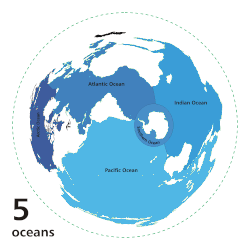








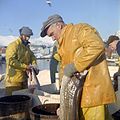




















![Image 30"Terres Australes" [sic] label without any charted landmass (from Southern Ocean)](http://upload.wikimedia.org/wikipedia/commons/thumb/8/8e/Geography_world_map.jpeg/120px-Geography_world_map.jpeg)




















